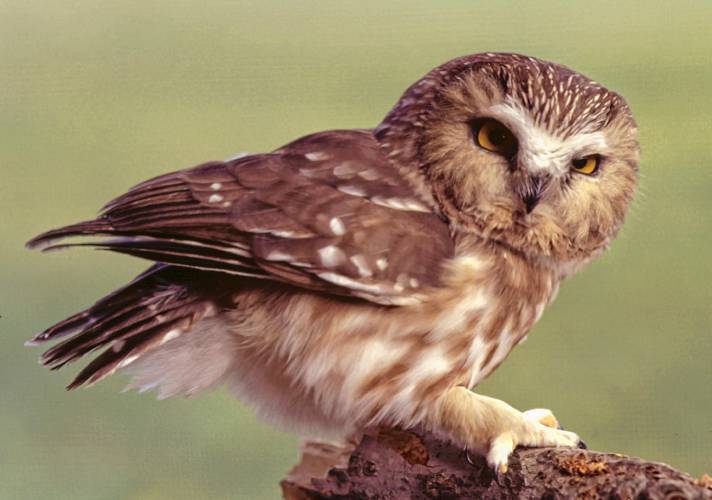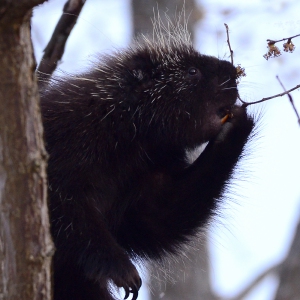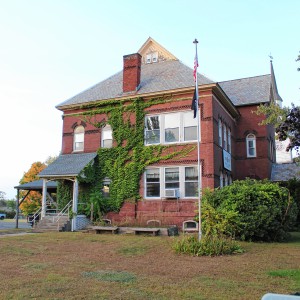Speaking of Nature: A romantic evening for two birders: To hear the wonderful sounds of the Saw-whet Owl, one must go outside at night

Tiny enough to comfortably perch on your index finger, the northern saw-whet owl packs a stare with attitude. PHOTO BY BILL DANIELSON
| Published: 02-12-2024 6:01 AM |
It was a cold winter’s night and my beautiful wife Susan and I were watching movies. There was a fire crackling in the wood stove, we were enjoying good food and drink and we were both all snoodled up and comfy. It was everything you could have wanted on a Saturday night and we were both calm, relaxed and happy. What could be better than that?
Suddenly, we heard the voices of multiple coyotes coming from our back yard. This is a fairly routine occurrence in our rural neighborhood because we have a fairly active group of coyotes that seem to spend quite a bit of their time within earshot. Sometimes they sound like they are in my yard, sometimes they sound like they are in the back woods, and other times they sound like they are way off to the north, east and west. I happen to love hearing this family group and over the years Susan has come around to it as well. The coyotes are never seen, but knowing that they are around adds a special element of wildness to our home.
However, on this particular night, the coyotes sounded like they might consider knocking on our back door. These guys were very close and, as a result, they were particularly loud. Susan and I looked and one another and smiled and then I suggested that we quickly put on our slippers and step out onto the deck to see if we might catch sight of dark shapes moving across the snowy background of our back yard.
Within seconds we were both outside, but the coyotes had been quick and they had already moved off into the woods to the south of my house. It had nothing to do with the fact that we were there, however, they were just involved with something and they had headed south. The blast of cold air was exhilarating and we both smiled as we listened to the pack moving further away, but then we heard something even more interesting. Coming from the east we heard a single loud note being repeated over and over again. I sounded like a toy whistle going “too-too-too.” I gasped, looked at Susan and exclaimed, “That is a Saw-whet Owl!”
We listened to the sound for a few more seconds, smiled again, and then finally returned to the coziness of the inside of our home. Slippers came off and we plopped back into our comfortable positions on the couch. I grabbed my phone and started looking for a recording of a Saw-whet Owl so that I could confirm what we had heard, but before I really had made any real progress I heard the song of the bird coming from Susan’s phone. “Wow, that’s it!” she exclaimed. I then realized that I had a birder on my hands.
This was a very special moment for me because it was only the second time in my life that I had heard the song of this extremely small owl. The first time was way back in the mid 19990s when I lived in Montague. I remember that I was out for a nighttime walk on a beautiful spring evening and I heard a sound that reminded me of the backup beeper on a truck. I initially ignored this sound, but then began to wonder why this truck kept backing up. And why at night? It was only after returning home and popping a cassette tape into my tape recorder (remember those days?) that I eventually found the same song and learned that it was an owl.
Of all the owls that regularly occur in the Northeast, the Northern Saw-whet Owl (Aegolius acadicus) is the smallest. Measuring in at a diminutive 8 inches long, with a wingspan of just 17 inches, this owl is routinely described as, “tiny.” The favorite prey items for this little hunter is mice and the bird is so small that an adult mouse will make for more than one meal. Half of a mouse seems to be all a Saw-whet Owl can eat at any one time.
A very common bird in northern North America, the Saw-whet Owl is highly nocturnal, which means that it is seldom seen by highly diurnal people. However, during the breeding season, which falls between January and May, the birds become quite vocal and are often heard. Again, diurnal humans rarely spend much time soaking up the cold on winter nights, so we likely miss out on a lot of this singing because we are inside where it is warm. I have no idea how long the individual in my yard had been singing when I finally heard it and I would have remained oblivious to its presence if not for the coyotes.
Article continues after...
Yesterday's Most Read Articles
 Keeping Score with Chip Ainsworth: UMass hockey girds for new campaign
Keeping Score with Chip Ainsworth: UMass hockey girds for new campaign
 My Turn: A rocky road ahead for Stone Farm Lane proposal
My Turn: A rocky road ahead for Stone Farm Lane proposal
 ‘There’s always people you know here’: Bernardston’s Scarecrow in the Park brings community together
‘There’s always people you know here’: Bernardston’s Scarecrow in the Park brings community together
 Speaking of Nature: A surprise in my maple tree: Porcupines just want to find something tasty to eat and be left alone
Speaking of Nature: A surprise in my maple tree: Porcupines just want to find something tasty to eat and be left alone
 Greg Franceschi: Support bike lanes and walking paths in South Deerfield
Greg Franceschi: Support bike lanes and walking paths in South Deerfield
 Lowest bid comes in at less than $6M for Deerfield’s 1888 Building project
Lowest bid comes in at less than $6M for Deerfield’s 1888 Building project
The photo that I selected for this week’s column was taken in 2000 after a person had reached out to me because she had found an injured bird. I was working as a wildlife rehabilitator at the time and I volunteered to serve as a middleman for transportation to a raptor specialist. I couldn’t resist the opportunity to take a few photos of that beautiful bird because I reasoned that I probably wouldn’t get another chance. So far, I have been correct in that assumption.
Once again, I am going to encourage you to go outside, but this time I am going to suggest that you go for an adventure at night in the springtime. This may be particularly easy as our continuing El Nino weather pattern might make warm nighttime walks occur earlier in the year. This is the beginning of the breeding season for owls and they will likely be quite vocal. The trick is that you just have to be outside where you can hear them.
Bill Danielson has been a professional writer and nature photographer for 26 years. He has worked for the National Park Service, the US Forest Service, the Nature Conservancy and the Massachusetts State Parks and he currently teaches high school biology and physics. For more in formation visit his website at www.speakingofnature.com, or go to Speaking of Nature on Facebook.






 ‘The freedom to be silly’: Hilltown Youth Recovery Theatre helps campers heal in mid-air
‘The freedom to be silly’: Hilltown Youth Recovery Theatre helps campers heal in mid-air How to grow a creative community: Meet the eight artists selected for CitySpace’s 2025 Pay It Forward program
How to grow a creative community: Meet the eight artists selected for CitySpace’s 2025 Pay It Forward program The melody lingers on: 85 years later, 102-year-old Montague resident to hear Glenn Miller band again
The melody lingers on: 85 years later, 102-year-old Montague resident to hear Glenn Miller band again Let’s Talk Relationships: The joy of feeling like yourself: Transitioning is about authenticity
Let’s Talk Relationships: The joy of feeling like yourself: Transitioning is about authenticity
